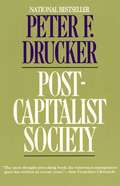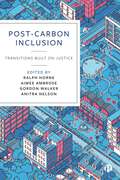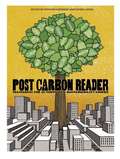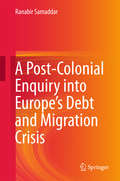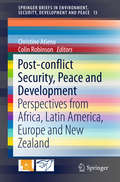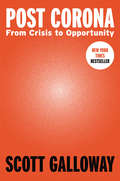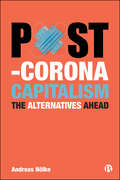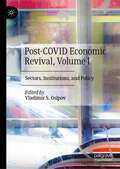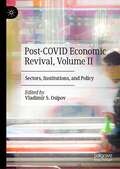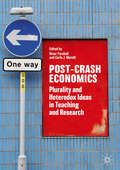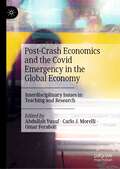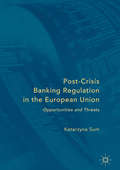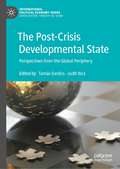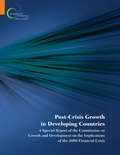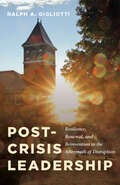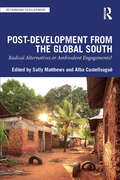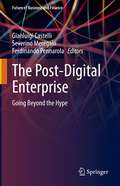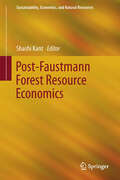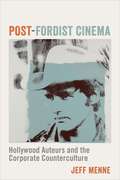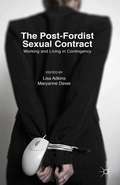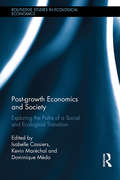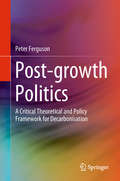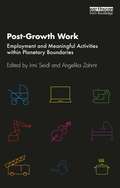- Table View
- List View
Post-Capitalist Society
by Peter F. DruckerBusiness guru Peter Drucker provides an incisive analysis of the major world transformation taking place, from the Age of Capitalism to the Knowledge Society, and examines the radical affects it will have on society, politics, and business now and in the coming years. This searching and incisive analysis of the major world transformation now taking place shows how it will affect society,economics, business, and politics and explains how we are movingfrom a society based on capital, land, and labor to a society whoseprimary source is knowIedge and whose key structure is theorganization.
Post-Carbon Inclusion: Transitions Built on Justice
by Ralph Horne, Aimee Ambrose, Gordon Walker and Anitra NelsonThis collection pays unique attention to the highly challenging problems of addressing inequality within decarbonisation – particularly under-explored aspects, such as high consumption, degrowth approaches and perverse outcomes. Contributors point out means and possibilities of the transition from high carbon inequalities to post-carbon inclusion. They apply a variety of conceptual and methodological approaches in all-inclusive ways to diverse challenges, such as urban heating and retrofitting. Richly illustrated with case studies from the city to the household, this book critically examines ‘just transitions’ to achieve sustainable societies in the future.
Post Carbon Reader: Managing the 21st Century's Sustainability Crises
by Richard Heinberg Daniel LerchHow do population, water, energy, food, and climate issues impact one another? What can we do to address one problem without making the others worse? The Post Carbon Reader features essays by some of the world's most provocative thinkers on the key issues shaping our new century, from renewable energy and urban agriculture to social justice and community resilience. This insightful collection takes a hard-nosed look at the interconnected threats of our global sustainability quandary and presents some of the most promising responses. Book jacket.
A Post-Colonial Enquiry into Europe’s Debt and Migration Crisis
by Ranabir SamaddarThis important and topical volume is composed around the debt and migration crisis in Europe in 2015 (known as the Greece crisis), and written almost concurrently as the two crises developed in quick succession. The central argument here is that Europe's present crisis suggests a post-colonial bind, or to put in stronger terms, a post-colonial destiny of Europe. The European situation bears remarkable similarity with the post-colonial condition elsewhere in the world and suggests a strong bond between Europe's present situation and the post-colonial bind in which much of the world finds itself. The purpose of this volume is to examine in the light of 21st century capitalism notions such as debt, crisis, rupture, dialogue, mobilization, neo-liberalism, war and migration, and the old, never to be settled, question of ideology. The volume ends with reflections on Europe's migration crisis, and reinforces the point that a critical post-colonial sense of history, accumulation, globalization, and the resilience of the nation form will help us reflect on the present European crisis, and draw appropriate lessons.
Post-Communist Democracies and Party Organization
by Margit TavitsScholars of post-communist politics often argue that parties in new democracies lack strong organizations - sizable membership, local presence, and professional management - because they don't need them to win elections and they may hinder a party's flexibility and efficiency in office. Post-Communist Democracies and Party Organization explains why some political parties are better able than others to establish themselves in new democracies and why some excel at staying unified in parliament, whereas others remain dominated by individuals. Focusing on the democratic transitions in post-communist Europe from 1990 to 2010, Margit Tavits demonstrates that the successful establishment of a political party in a new democracy crucially depends on the strength of its organization. Yet not all parties invest in organization development. Tavits finds that when parties recognize the potential of organization building, it is often the result of pragmatic professional leaders and particularly competitive, even hostile, electoral environments. This book uses data from ten post-communist democracies, including detailed analysis of parties in the Czech Republic, Estonia, Hungary, and Poland.
Post-conflict Security, Peace and Development: Perspectives From Africa, Latin America, Europe And New Zealand (Springerbriefs In Environment, Security, Development And Peace Ser. #13)
by Christine Atieno Colin RobinsonThis book examines links between post-conflict security, peace and development in Africa, Latin America, Europe and New Zealand. Young peace researchers from the Global South (Uganda, Ivory Coast, Kenya, Brazil, Colombia) as well as from Italy and New Zealand address in case studies traumas in Northern Uganda, demobilisation and reintegration of ex-combatants in the Ivory Coast, economic and financial management of terrorism in Kenya, organised crime in Brazil, mental health issues in Colombia, macro realism in Europe and global defence reforms within the military apparatus since 1990. The book reviews linkages between regional stability, development and peace in post-conflict societies while adding on to the post 2015 international agenda and discusses linkages between peace, security and development.
Post Corona: From Crisis to Opportunity
by Scott Galloway"This is as good an analysis as you could wish to read." --The Financial TimesFrom bestselling author and NYU Business School professor Scott Galloway comes a keenly insightful, urgent analysis of who stands to win and who's at risk to lose in a post-pandemic worldThe COVID-19 outbreak has turned bedrooms into offices, pitted young against old, and widened the gaps between rich and poor, red and blue, the mask wearers and the mask haters. Some businesses--like home exercise company Peloton, video conference software maker Zoom, and Amazon--woke up to find themselves crushed under an avalanche of consumer demand. Others--like the restaurant, travel, hospitality, and live entertainment industries--scrambled to escape obliteration.But as New York Times bestselling author Scott Galloway argues, the pandemic has not been a change agent so much as an accelerant of trends already well underway. In Post Corona, he outlines the contours of the crisis and the opportunities that lie ahead. Some businesses, like the powerful tech monopolies, will thrive as a result of the disruption. Other industries, like higher education, will struggle to maintain a value proposition that no longer makes sense when we can't stand shoulder to shoulder. And the pandemic has accelerated deeper trends in government and society, exposing a widening gap between our vision of America as a land of opportunity, and the troubling realities of our declining wellbeing.Combining his signature humor and brash style with sharp business insights and the occasional dose of righteous anger, Galloway offers both warning and hope in equal measure. As he writes, "Our commonwealth didn't just happen, it was shaped. We chose this path--no trend is permanent and can't be made worse or corrected."
Post-Corona Capitalism: The Alternatives Ahead
by Andreas NölkeThe COVID-19 pandemic is a Rorschach test for society: everyone sees something different in it, and the range of political and economic responses to the crisis can leave us feeling overwhelmed. This book cuts through the confusion, dissecting the new post-coronavirus capitalism into several policy areas and spheres of action to inform academic, policy and public discourse. Covering all the major aspects of contemporary capitalism that have been affected by the pandemic, Andreas Nölke deftly analyses the impacts of the crisis on our socio-economic and political systems. Signposting a new era for global capitalism, he offers alternatives for future economic development in the wake of COVID-19.
Post-COVID Economic Revival, Volume I: Sectors, Institutions, and Policy
by Vladimir S. OsipovThis two-volume book examines the most important global problem—the recovery of the social-economic crises due to the COVID-19 pandemic. This economic crisis has its own basis and differs from others by the lockdown of most businesses on the decision of authorities. The uncertainty of the future economic revival obliges scientists around the world to unite in search of effective solutions that will become the basis for prosperity and human wellbeing.The death of millions of people around the world, several waves of coronavirus, and a global pandemic have forced most states to seek extraordinary measures to save people and revive economic activity. The world economy experienced a global shock, probably never experienced before due to lockdowns. The disruptions and gaps in the value chains were primarily caused by the lockdowns of enterprises. The change in the essence of the economic crisis has raised the question of how to overcome it and revive economic activity. The crisis caused a sharp decline in incomes of the population around the world, which led to social upheavals. Post-COVID economic revival in a globalized world has become the most important problem of our time. This book offers contributions of authors from different countries and explores problem solving in the fields of public administration (Volume I, Part I), financial services (Volume I, Part II), different branches (Volume II, Part III) and the social sector (Volume II, Part IV).The first volume discusses governmentality, public, and corporate management. The second part of the volume reveals the trends in the development of the financial sector in the post-COVID period. Despite the fact that the book is divided into two volumes and four parts, a holistic and systematic perception of the new reality of the post-COVID age can be obtained by reading the entire book. This book will be of interest to academics and practitioners in public administration and economics, particularly those who are interested in Post-COVID economic revival.
Post-COVID Economic Revival, Volume II: Sectors, Institutions, and Policy
by Vladimir S. OsipovThis two-volume book examines the most important global problem—the recovery of the social-economic crises due to the COVID-19 pandemic. This economic crisis has its own basis and differs from others by the lockdown of most businesses on the decision of authorities. The uncertainty of the future economic revival obliges scientists around the world to unite in search of effective solutions that will become the basis for prosperity and human wellbeing. The death of millions of people around the world, several waves of coronavirus, and a global pandemic have forced most states to seek extraordinary measures to save people and revive economic activity. The world economy experienced a global shock, probably never experienced before due to lockdowns. The disruptions and gaps in the value chains were primarily caused by the lockdowns of enterprises. The change in the essence of the economic crisis has raised the question of how to overcome it and revive economic activity. The crisis caused a sharp decline in incomes of the population around the world, which led to social upheavals. Post-COVID economic revival in a globalized world has become the most important problem of our time. This book offers contributions of authors from different countries and explores problem solving in the fields of public administration (Volume I, Part I), financial services (Volume I, Part II), different branches (Volume II, Part III) and the social sector (Volume II, Part IV). The second volume of the book is devoted problems in sectors of the economy, such as agriculture, tourism, aircraft, the automotive industry, electricity, culture, etc. The second part of the second volume examines trends in the revival in the social sector—medicine, pharmaceuticals, the labor market and social insurance. Despite the fact that the book is divided into two volumes and four parts, a holistic and systematic perception of the new reality of the post-COVID age can be obtained by reading the entire book. This book will be of interest to academics and practitioners in public administration and economics, particularly those who are interested in Post-COVID economic revival.
Post-Crash Economics
by Omar Feraboli Carlo J. MorelliThis book demonstrates the continuing relevance of economics for understanding the world, through a restatement of the importance of plurality and heterodox ideas for teaching and research. The Great Financial Crash of 2007-8 gave rise to a widespread critique of economics for its inability to explain the most significant economic event since the 1930s. The current straightjacket of neo-classical undergraduate economic teaching and research hinders students' understanding of the world they live in. The chapters in this book provide examples to demonstrate the importance of pluralistic and heterodox ideas from across the breadth of economics. The authors' plurality of approach is indicative of the fact that economics is a much broader discipline than the dominant neo-classical orthodoxy would suggest. This volume provides undergraduate students with a range of alternative ideas and university lecturers with examples whereby the curricula have been broadened to include pluralist and heterodox ideas.
Post-Crash Economics and the Covid Emergency in the Global Economy: Interdisciplinary Issues in Teaching and Research
by Abdullah Yusuf Carlo J. Morelli Omar FeraboliThis book continues the ongoing debate about the need for alternative, interdisciplinary and heterodox approaches to teaching economics at university. It deals with challenges currently faced by economists, pursues an interdisciplinary approach to enhance collaboration with academics from disciplines other than economics, and analyses several questions and issues related to the 2007-08 financial crisis and the current Covid-19 emergency. The Covid pandemic has shown the flaws of the current neoliberal model and the inability of mainstream economic theory to address the problems created by the pandemic. The book engages with an academic audience interested in incorporating a wider range of economic approaches in their research and teaching, and with undergraduate and postgraduate economics students who are trying to understand the limitations of their current economics syllabi. The novelty of the book is the active involvement of undergraduate and postgraduate students who contribute to this volume with three chapters. The book will be of interest to a wide range of researchers, students and teachers interested in interdisciplinary and heterodox economics.
Post-Crisis Banking Regulation in the European Union
by Katarzyna SumThis book offers holistic, economic analysis of the on-going regulatory reform in the European banking industry. The author addresses the main opportunities and pitfalls related to post-crisis financial regulation, and investigates whether the proposed solutions provide an appropriate response to the problems within the EU's ailing banking sector. The author gives particular focus to the implementation of Basel III, the introduction of the Banking Union, the inclusion of bank governance elements into regulatory frameworks, and the country-specific aspects of regulation at a national level. The discussion builds upon existing literature in the field and takes a novel approach in its examination of banking regulations, their endogeneity and their interactions with bank governance. The book also analyses banking regulation in the EU within theoretical frameworks, as well as by means of empirical exercises. Insights into the theory and practical aspects of banking regulation make this book a valuable read for academics, researchers, students and practitioners alike.
The Post-Crisis Developmental State: Perspectives from the Global Periphery (International Political Economy Series)
by Tamás Gerőcs Judit RiczThe focus of this volume is on the role of the developmental state in a situation in which a series of major crises affects the (semi-) periphery of the global economy. The authors go beyond the established debate on developmental states in East Asia by highlighting a much broader understanding of development and a very different global economic context. They also further the existing debate by covering new country cases. At the same time, they deepen our perspective on developmental states by looking at unusual sectors such as green industrial policy, education and farming.
Post-Crisis Growth in Developing Countries
by Commission on Growth and DevelopmentThe 2008 financial crisis has raised a number of questions about the best strategy for achieving sustained growth and poverty reduction in developing countries, foremost among them whether the failure of the financial system also signifies the broader failure of market-oriented capitalist systems. The Growth Commission believes that the crisis was not a failure of market-oriented systems and that an outward-looking strategy, as suggested in the original Growth Report (published in May 2008), remains broadly valid. The following questions are discussed in this special report: - How has the economic landscape changed in the wake of the financial crisis of 2008? - What factors contributed to the onset of the financial crisis and its transmission from advanced to developing countries? - Should the crisis be interpreted as a failure of financial-sector regulation or as a broader failure of market-based systems? - What effects will the financial crisis have on the prospects for economic growth in developing countries? - How will the crisis impact the formulation of developing country growth strategies going forward? - What is the outlook for free trade and a growth model that capitalizes on the global economy? - How do actions by the advanced economies in response to the crisis affect the choices of policy makers in the developing world? - What is the appropriate role of government in the post-crisis economy? - How will the lessons of the crisis affect strategies for financial-sector development in developing countries? - What are the prospects for improved international oversight of global finance and cross-border financial flows?
Post-Crisis Leadership: Resilience, Renewal, and Reinvention in the Aftermath of Disruption
by Ralph A. GigliottiGiven the many pressures facing leaders across higher education, the work of crisis leadership remains an imperative for leaders at all levels. Attention tends to center on strategies for engaging in leadership both prior to and during crisis, often leaving the post-crisis period as an afterthought. This book introduces a research-informed framework for this critical, and often neglected, phase of crisis leadership. With an underlying commitment to values-based, principle-oriented, and people-centered practices, this framework consists of five leadership practices that are recognized as especially critical in the aftermath of crisis: (a) encourage learning, (b) inspire growth, (c) stimulate meaning-making, (d) pursue reinvention, and (e) advance renewal. Communication serves a critical role in each of the various dimensions of post-crisis leadership, and it is a communication orientation that can help to inform the paradoxes, processes, and patterns that arise during these periods of immense tension and, at times, transcendence.
Post-Development from the Global South: Radical Alternatives or Ambivalent Engagements? (Rethinking Development)
by Sally MatthewsPost-development advocates and decolonial thinkers are calling for radical alternatives to development, but how do these ideals sit with the day-to-day reality of marginalised communities struggling with poverty, precarity, and the deprivation of human rights?This book investigates how post-development alternatives are being understood and negotiated on the ground in the Global South. Indigenous concepts and practices attributed to people in the Global South are seen by post-development thinkers as offering transformative alternatives to dominant development models of progress and economic growth. For example, buen vivir from particular regions of South America points to a ‘culture of life’ and ubuntu in Southern Africa emphasises human connectedness and mutuality. Such terms are associated with social and environmental sustainability, and a greater connection to Southern epistemologies. Drawing on extensive fieldwork, this book takes us directly to Global South communities from around the world, to consider the complex ways in which they negotiate the ideas and practices associated with (post)development, and their views on the supposed indigenous alternatives. The book encourages a contextual approach that embraces the tensions and contradictions that exist within different communities.Taking the reader from abstract post-development theory right into the heart of communities directly impacted by development, this book will be an important guide for students, researchers and practitioners looking for better ways to address the desires and aspirations of marginalised communities in the Global South.
The Post-Digital Enterprise: Going Beyond the Hype (Future of Business and Finance)
by Gianluigi Castelli Severino Meregalli Ferdinando PennarolaA new wave of digital technologies has impacted the business world like a tsunami. But after a first phase characterized by hype and unrealistic expectations, there is now a shared need for a better understanding of how to create real and sustainable value by adopting these technologies. This book suggests a pragmatic approach to value creation by embracing the post-digital mindset: a more mature attitude toward digital innovation focused on putting these technologies at work rather than marveling at them. After the illustration of a post-digital manifesto, the book explores all the key topics and tools that are relevant for the decision makers in this context.
Post-EEG-Anlagen in der Energiewirtschaft: Praxishilfe für Energieversorgungsunternehmen und Anlagenbetreiber zum Umgang mit ausgeförderten Anlagen
by Marcel LinnemannBetreiber von Anlagen, die unter das EEG fallen, werden vor der Frage stehen, wie der weitere Betrieb sicherzustellen ist. Dieses Buch zeigt die Möglichkeiten zur Vermarktung solcher Anlagen für Energieversorger und Anlagenbetreiber auf, bespricht die Hintergründe sowie die Vertragsgestaltung. Messkonzepte für unterschiedliche Vermarktungskonzepte (Volleinspeisung, Überschusseinspeisung) sowie die regulatorische Einordung (Steuern, EEG Umlage ect.) sind ebenso berücksichtigt.
Post-Faustmann Forest Resource Economics
by Shashi KantThe current paradigm of forest economics is based on Faustmann Formulation (FF) of land expectation value proposed by Martin Faustmann. It was a great achievement by a forester to propose a formulation that captures some fundamental economic features of capital theory which. However, the followers of the FF approach have trapped themselves into the past, and have not shown any indication of economic acumen of the great Faustmann. This has resulted in a common problem in the current paradigm of forest economics, known as Faustmann Forest Resource Economics (FFRE), to prescribe the application of a single (FF) approach to all situations irrespective of the specific features of the situation. The current state of forest economics is similar to that of neoclassical economics, and is full of inefficiencies. In neoclassical economics, inefficiencies are due to its "locked-in" position in rational economic man, while in forest economics inefficiencies are due to its "locked-in" position in the FF. The focus of this volume is on the new paradigm of forest economics termed as Post-Faustmann Forest Resource Economics (PFFRE). The first chapter lays the foundation of the PFFRE, and presents the key distinctions between the FFRE and the PFFRE. The volume includes twelve other chapters that address issues related to forest economics from perspectives different than the FFRE. Chapter 2 to 6 are focused on issues related to human behavior that is different than the rational economic man, Chapter 7 and 8 on public choice theory, Chapter 9 and 10 on systems approaches, and Chapter 11 to 13 on incremental approaches to incorporate new features in the FFRE.
Post-Fordist Cinema: Hollywood Auteurs and the Corporate Counterculture (Film and Culture Series)
by Jeff MenneThe New Hollywood boom of the late 1960s and 1970s is celebrated as a time when maverick directors bucked the system. Against the backdrop of counterculture sensibilities and the prominence of auteur theory, New Hollywood directors such as Robert Altman and Francis Ford Coppola seemed to embody creative individualism. In Post-Fordist Cinema, Jeff Menne rewrites the history of this period, arguing that auteur theory served to reconcile directors to Hollywood’s corporate project.Menne traces the surprising affinities between auteur theory and management gurus such as Peter Drucker, who envisioned a more open and flexible corporate style. In founding production companies, New Hollywood filmmakers took part in the creation of new corporate models that emphasized entrepreneurial creativity. For firms such as Kirk Douglas’s Bryna Productions, Altman’s Lion’s Gate Films, the Zanuck-Brown Company, and BBS Productions, the counterculture ethos limbered up the studio system’s sclerotic production process—with striking parallels to how management theory conceived of the role of the individual within the firm. Menne offers insightful readings of how films such as Lonely Are the Brave, Brewster McCloud, Jaws, and The King of Marvin Gardens narrate the conditions in which they were created, depicting shifting notions of work and corporate structure. While auteur theory allowed directors to cast themselves as independent creators, Menne argues that its most consequential impact came as a management doctrine. An ambitious rethinking of New Hollywood, Post-Fordist Cinema sheds new light on the cultural myth of the great director and the birth of the “creative economy.”
The Post-Fordist Sexual Contract: Working and Living in Contingency
by Lisa Adkins Maryanne DeverThis collection analyzes shifting relationships between gender and labour in post-Fordist times. Contingency creates a sexual contract in which attachments to work, mothering, entrepreneurship and investor subjectivity are the new regulatory ideals for women over a range of working arrangements, and across classed and raced dimensions.
Post-growth Economics and Society: Exploring the Paths of a Social and Ecological Transition (Routledge Studies in Ecological Economics)
by Isabelle Cassiers Kevin Maréchal Dominique MédaWe stand on the threshold of a "post-growth" world – one in which the relentless pursuit of economic growth has ceased to constitute a credible societal project. The symptoms that mark the end of an era are clear and incontrovertible: a return to the regularities of the past is illusory. The pursuit of economic growth no longer constitutes a credible societal project for ecological, social, and geopolitical reasons. Edited by an impressive array of experts, this book identifies several areas in which we must fundamentally rethink our societal organisation. They ask what it means to abandon the objective of economic growth; how we can encourage the emergence of other visions to guide society; how global visions and local transition initiatives should be connected; which modes of governance should be associated with the required social and technological innovations. Alongside the necessary respect of ecological limits and equity in distribution, the promotion of autonomy (involving all in the building of socio-political norms) could serve for guidance. The topics addressed over the chapters range from the future of work to the de-commodification of economic relations; the search for new indicators of progress to decentralized modes of governance; and from the circular economy to polycentric transitions. Each contribution brings a unique perspective, a piece of a larger puzzle to be assembled. Post-growth Economics and Society is an important volume to those who study ecological economics, political economy and the environment and society. It invites theorists as much as practitioners to re-explore the roots of our societal goals and play an active role in the systemic shift to come.
Post-growth Politics: A Critical Theoretical and Policy Framework for Decarbonisation (Green Energy and Technology)
by Peter FergusonThis book uses a critical political economy approach to develop an historically and politically grounded set of strategies for states to move toward a post-growth, decarbonised global economy. It begins by examining the social and ecological costs of and limits to economic growth and determines that significant decarbonisation of the global economy can only be achieved if conventional growth-based economies are replaced by an alternative post-growth economy.Set apart from many other works in the field by its critical political economy approach to policy development, this book offers the reader three distinctive features. First, it places the analysis in historical context in order to demonstrate how the global political economy is constantly changing with respect to distributions of wealth, power and fundamental norms, and explores how states might harness and transform these contingent patterns in a post-growth direction. Second, the book is not only concerned with developing and advocating post-growth policies, but also with how these measures can be incorporated into the high-level domestic and international strategies pursued by states to ensure their political legitimacy and economic and geopolitical survival. Third, rather than proposing an idealised and politically naïve model of socioecological transformation, the proposed post-growth policy framework is highly cognisant of the geopolitical and international economic pressures facing states and demonstrates how these can be managed in the transition toward a post-growth economy.This book represents an invaluable resource for policymakers, academics, activists and students wishing to study or contribute to the transition to a post-growth, decarbonised economy.
Post-Growth Work: Employment and Meaningful Activities within Planetary Boundaries
by Irmi Seidl Angelika ZahrntThis book argues that society must rethink the notion of formal employment and instead introduce and spread the notion of "meaningful work" so that societies can become independent of economic growth. The excessive consumption of natural resources and the immense emissions resulting from our growth-oriented economic system surpass the planetary boundaries. Despite this, society and the economy still strive for economic growth in order to generate jobs, to finance the social security system and to assure tax income. However, these expectations are increasingly unrealistic, not least because technological developments such as digitalisation and robotisation will change and limit formal employment opportunities as well. Against this backdrop, the book introduces the notion of meaningful activities that embrace various kinds of work, paid and unpaid, sequential or in parallel, which are meaningful for the worker as well as society as a whole. At the same time, the authors argue in favour of reduced working time in formal employment. Furthermore, the book also describes the necessary transformations in companies and for consumers, for social and tax systems, for social services and agriculture. Innovative and timely, this book will be a key resource for professionals and scholars interested in sustainability, economics, work, transformation and post-growth studies.
